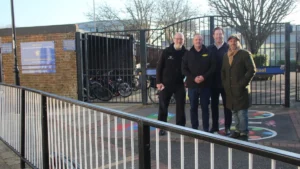A more ‘personalised’ approach is needed to reduce people’s exposure to polluted air, says an Imperial expert.
Dr Benjamin Barratt, Deputy Director of the Environmental Research Group at Imperial College London, says there is a perception amongst some of the public that poor air quality is a general problem, solely requiring government interventions, but in reality it is also a personal problem and something we’re all exposed to, and our bodies respond to, differently.
Dr Barratt was speaking at the joint Imperial College Academic Health Science Centre (AHSC) and Grantham Institute COP26 online seminar which took place earlier this month. He was joined by Emma Lawrance, Mental Health Innovations Lead at the Institute of Global Health Innovation at Imperial, who talked about her work on how mental health is worsening as a result of climate change.
At the seminar, Dr Barratt talked about his work leading the Breathe London project that monitored the quality of the air children were exposed to. The team collaborated with Dyson to mass produce wearable sensors which were attached to children’s backpacks to monitor their school journeys.
The findings of the project, which enabled the school children and their parents to see how the amount of pollution they breathed spiked when they travelled on certain routes, or travelled to and from school by car rather than walked, led to children and families being able to make decisions to reduce their personal exposure to pollution. One school reported a 54 per cent decrease in the number of people who drove their children to school following the study. Overall, thirty one per cent of children and parents changed the way they commuted to and from school to a healthier alternative, such as walking to school a street away from the main road.
Dr Barratt said: “Air pollution is a major health challenge and over the last decade awareness and understanding of this has improved rapidly. However, more work needs to be done to empower people to have some agency over the air quality that they are exposed to and the actions needed to tackle this.
“Exposure reduction is important as a public health focus, as it will lead to better physical and mental health outcomes. Our Breathe London project has started to have an impact and we are aiming to expand this globally.”
Dr Barratt also talked about the next phase of the Breathe London project, funded by the Mayor of London and supported by Bloomberg Philanthropies, which will see more than 200 low-cost sensors installed at hospitals, schools and other priority locations, giving communities access to affordable and reliable air quality data for the first time.
The aim is to put air quality monitoring into the hands of London’s communities. The project will focus on reaching communities that research shows have previously been less engaged with environmental programmes, including low-income and Black, Asian and Minority Ethnic groups.
Pic-Imperial College
























